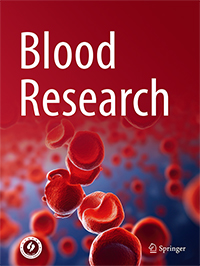Original Article
Korean J Hematol 2005; 40(3):
Published online September 30, 2005
https://doi.org/10.5045/kjh.2005.40.3.149
© The Korean Society of Hematology
Transforming Growth Factor-Ղ1이 악성림프종과 백혈병 세포주의 성장, c-myc mRNA 발현, Telomerase 활성에 미치는 영향
이주호, 이미자, 전호종, 홍찬표, 박치영, 정춘해
조선대학교 의과대학 병리학교실, 혈액종양 내과학교실
Effect on Cell Growth, c-myc mRNA Expression and Telomerase Activity by Transforming Growth Factor-Ղ1 in Malignant Lymphoma and Leukemia Cell Line
Background:
Transforming growth factor-Ղ1 (TGF-Ղ1) is known to be a potent growth inhibitor of many cell types, including most epithelial cells. However, the mechanism of TGF-Ղ1 action on cell growth in lymphomas and leukemia still remains to be elucidated. c-myc is a central regulator of cell proliferation and apoptosis, and telomerase is believed to play an important role in carcinogenesis. The aim of the study was to determine the effects of cell growth, c-myc gene expression and telomerase activity due to TGF-Ղ1 and examine its mechanism of action in lymphomas and leukemia.
Methods:
The cell growths of Jiyoye (Burkitt lymphoma), H9 (T cell lymphoma), and CCRF-CEM (acute lymphocytic leukemia, T cell) cell lines due to TGF-Ղ1 were measured using the MTT assay. RT-PCR was also performed to monitor the expression of the c-myc gene in these cells with the telomerase activity measured using a TRAP assay.
Results:There was significant inhibition of cell growth in TGF-Ղ1 (5ng/mL) treated Jiyoye cells. When treated with TGF-Ղ1, the Jiyoye cells exhibited marked decreases in the levels of c-myc RNA and telomerase activity. However, TGF-Ղ1 treated H9 and CCRF-CEM cells showed no cell growth inhibition or reductions in the levels of c-myc mRNA and telomerase activity. The effect of TGF-Ղ1 on cell growth was noted to closely correlate with c-myc mRNA expression and telomerase activity.
Conclusion: These results suggest that TGF-Ղ1 may inhibit cell growth in Jiyoye cells by a mechanism involving down-regulation of the c-myc gene, which in turn, reduces the telomerase activity.
Keywords Cell growth, c-myc genes, Telomerase, TGF-Ղ1, Lymphoma, Leukemia
Article
Original Article
Korean J Hematol 2005; 40(3): 149-158
Published online September 30, 2005 https://doi.org/10.5045/kjh.2005.40.3.149
Copyright © The Korean Society of Hematology.
Transforming Growth Factor-Ղ1이 악성림프종과 백혈병 세포주의 성장, c-myc mRNA 발현, Telomerase 활성에 미치는 영향
이주호, 이미자, 전호종, 홍찬표, 박치영, 정춘해
조선대학교 의과대학 병리학교실, 혈액종양 내과학교실
Effect on Cell Growth, c-myc mRNA Expression and Telomerase Activity by Transforming Growth Factor-Ղ1 in Malignant Lymphoma and Leukemia Cell Line
Zhu hu Li, Mi Ja Lee, Ho Jong Jeon, Chan Pyo Hong, Chi Young Park, Choon Hae Chung
Departments of, Pathology and, Hematology, Oncology Division of Internal Medicine, College of Medicine, Chosun University, Gwangju, Korea
Abstract
Background:
Transforming growth factor-Ղ1 (TGF-Ղ1) is known to be a potent growth inhibitor of many cell types, including most epithelial cells. However, the mechanism of TGF-Ղ1 action on cell growth in lymphomas and leukemia still remains to be elucidated. c-myc is a central regulator of cell proliferation and apoptosis, and telomerase is believed to play an important role in carcinogenesis. The aim of the study was to determine the effects of cell growth, c-myc gene expression and telomerase activity due to TGF-Ղ1 and examine its mechanism of action in lymphomas and leukemia.
Methods:
The cell growths of Jiyoye (Burkitt lymphoma), H9 (T cell lymphoma), and CCRF-CEM (acute lymphocytic leukemia, T cell) cell lines due to TGF-Ղ1 were measured using the MTT assay. RT-PCR was also performed to monitor the expression of the c-myc gene in these cells with the telomerase activity measured using a TRAP assay.
Results:There was significant inhibition of cell growth in TGF-Ղ1 (5ng/mL) treated Jiyoye cells. When treated with TGF-Ղ1, the Jiyoye cells exhibited marked decreases in the levels of c-myc RNA and telomerase activity. However, TGF-Ղ1 treated H9 and CCRF-CEM cells showed no cell growth inhibition or reductions in the levels of c-myc mRNA and telomerase activity. The effect of TGF-Ղ1 on cell growth was noted to closely correlate with c-myc mRNA expression and telomerase activity.
Conclusion: These results suggest that TGF-Ղ1 may inhibit cell growth in Jiyoye cells by a mechanism involving down-regulation of the c-myc gene, which in turn, reduces the telomerase activity.
Keywords: Cell growth, c-myc genes, Telomerase, TGF-Ղ,1, Lymphoma, Leukemia

Article Tools
Stats or Metrics
Related articles in BR
-
Genomic technologies for detecting structural variations in hematologic malignancies
Mi‑Ae Jang
Blood Res 2024; 59(): -
Clinical characteristics and outcomes of varicella zoster virus infection in children with hematologic malignancies in the acyclovir era
Seul-Ki Kim, Min Chae Kim, Seung Beom Han, Seong Koo Kim, Jae Wook Lee, Nack-Gyun Chung, Bin Cho, Dae Chul Jeong, Jin Han Kang, and Hack-Ki Kim
Blood Res 2016; 51(4): 249-255 -
The role of next-generation sequencing in hematologic malignancies
Young‑Uk Cho
Blood Res 2024; 59():




 PDF
PDF Standard view
Standard view Export citation
Export citation Share
Share  Previous Article
Previous Article



